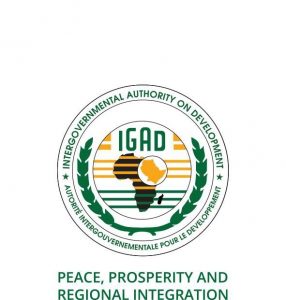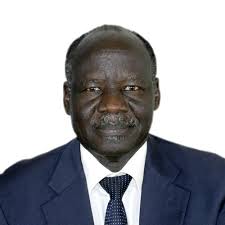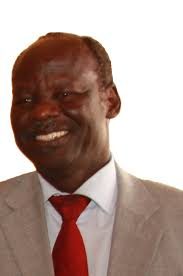
THE IGAD SPECIAL ENVOY FOR SOUTH SUDAN
PROGRESS REPORT
ON THE HIGH LEVEL REVITALIZATION OF THE AGREEMENT
ON THE RESOLUTION OF THE CONFLICT IN THE REPUBLIC OF SOUTH SUDAN
PRESENTED TO
THE IGAD COUNCIL OF MINISTERS’ 61st EXTRA-ORDINARY SESSION HELD IN ADDIS ABABA, ETHIOPIA
MARCH 26, 2018
A. INTRODUCTION
1. This report to the Council of Ministers encapsulates the status of implementation of the High Level Revitalization Forum (HLRF) activities pursuant to the decision of the IGAD Heads of State and Government. It highlights key developments in the revitalization process since my last briefing to the Council.
2. As mandated by the IGAD Assembly on the 12th June 2017, the HLRF a has brought together all the Parties to the Agreement on the Resolution of the Conflict in the Republic of South Sudan (ARCSS) and estranged groups to deliberate and agree upon: a) concrete measures to restore the permanent ceasefire; b) restoring full and inclusive implementation of the ARCSS, and c) developing a revised and realistic timeline and ARCSS implementation schedule towards a democratic election at the end of the transitional period. The Forum will also have to agree upon implementation and oversight mechanisms as well as resource mobilization mechanism for the revitalized ARCSS.
3. This report is intended to assist the Council in making in determining how to urgently address the challenges that could derail, delay and/or undermine expeditious conclusion of the HLRF dialogue.
4. The report is therefore structured as follows: It recaps the main activities the Office of the IGAD Special Envoy for South Sudan has undertaken over the past two months pursuant to the mandate of the HLRF; it underscores the revitalization milestones achieved during the reporting period; and, takes stock of the key lessons learnt, including challenges faced. The report concludes with recommendations to the Council for consideration.
B. PHASE II OF THE FORUM
5. Phase I of the Forum ended on 22 December 2017 after the signing of the Agreement on Cessation of Hostilities, Protection of Civilians and Humanitarian Access (CoHA) and adoption of its implementation matrix. This was followed by a workshop convened by the Ceasefire and Transitional Security Arrangements Monitoring Mechanism (CTSAMM) on 24th and 25th January 2018 to discuss modalities to ensure full
implementation of the CoHA. The Agreement is intended to silence the guns in South Sudan, protect civilians and facilitate humanitarian access.
6. Phase II of the Forum was convened from 5th – 16th February 2018 for the parties to deliberate on: a) Governance during the Transitional Period, focusing on Chapter I of the ARCSS; and, b) Permanent Ceasefire and Transitional Security Arrangements, focusing on Chapter II of the ARCSS.
7. The Forum commenced with discussions on a set of guiding principles to facilitate the deliberations. The Forum reviewed specific provisions of Chapter I of the ARCSS during plenary sessions, and the Facilitation held targeted consultations with different delegations with a view to unlocking contentious issues. With regard to Chapter II of the ARCSS, a technical committee of the parties was established and it held intensive consultations with support from the Facilitation, and reported its progress to the plenary.
8. Overall, these approaches allowed for substantial progress on the three main agenda items discussed, namely, a Declaration of Principles (DoP), Governance and Security during the transitional period as highlighted below.
9. Regarding the DoP, the Parties undertook intensive discussions and reached consensus on 27 out of the 28 principles. The only point of disagreement on the DoP was on the article which provided for punitive measures against spoilers of the peace process. Whilst other Parties signed the DoP, the Transitional Government of National Unity (TGoNU) abstained. However, it reiterated the government’s unwavering determination and commitment to peace.
10. The parties also deliberated on governance during the Transitional Period and fully agreed on the following: mandate of the revitalized TGoNU (Art. 2); transitional institutions and mechanisms (Art.14), and national elections (Art.16). In addition, they partially agreed on the judiciary (Art. 12), and the National Constitutional Amendment Committee (NCAC) (Art. 13). The parties did not reach consensus on a number of other issues, including: responsibility sharing, including in the structure of the Executive and composition of the Legislature; the question of federalism; the number of States; the composition of the body to identify reforms in the Judiciary; and, the composition of the NCAC.
11. Certain parties also proposed a full discussion on the root causes of the current conflict and the challenges that emerged in the implementation of ARCSS of 2015. Others proposed the adoption of a set of additional principles on the basis of which the deliberations on the governance arrangements should be conducted.
12. The parties have divergent views on the extent to which the ARCSS should be amended. The TGoNU advocates for maintaining the status quo as far as possible, with minimum adjustments but accepts that the government should be expanded to accommodate the Opposition. For their part, the Opposition propose a fundamental restructuring of the government including: reducing the size of the Executive and Legislature; reverting to the original ten States; adopting a federal system of government during the Transitional Period; reviewing the powers of the President; and, enhancing the inclusivity of the government.
13. On Security issues, the Parties discussed in detail all provisions of Chapter II of the ARCSS. This included the permanent ceasefire (Art. 1); separation, assembly and cantonment (Art.2); national architecture for permanent ceasefire and unification of forces (Art.3); Ceasefire and Transitional Security Arrangements Monitoring Mechanism (CTSAMM) (Art.4); the transitional security arrangements (Art. 5); a Strategic Defence and Security Review (SDSR) (Art.6); and, the unification of forces (Art.7).
14. Although the Parties reached consensus on a number of provisions on security, they disagreed on certain fundamental issues. These included transitional security arrangements, and the process and timelines for the unification of forces; cantonment and demilitarization of ‘population centers’; protection of opposition leaders; restructuring of the security sector.
15. In summary, the parties made substantial progress and agreed on a number of issues which they initialed. However, there remain other contentious issues that warrant further engagement with the parties in order to assist them to reach agreement.
C. OBSERVATIONS AND CONCLUSIONS
16. Overall, the parties engaged constructively and diligently in their deliberations. There was commendable coordination and cooperation with the Facilitation team, and continual consultation with the parties and other stakeholders.
17. The revitalization has continued to elicit support and enthusiasm among the South Sudanese and from other stakeholders, including the international community.
18. The progress registered at the Forum was in significant part due to adequate planning by the IGAD Facilitation team, the unwavering support of the IGAD Council of Ministers, the AU, UN and international partners. It also reflected the parties’ willingness to engage constructively on the issues.
19. The Forum received invaluable direction from the IGAD Council of Ministers, represented by the State Minister of the Federal Democratic Republic of Ethiopia, and other members of the Council who attended the Forum.
20. Member states of the African Union High Level ad hoc Committee on South Sudan, the African Union Commission, the United Nations, European Union, Troika, International Partners Forum and China observed the proceedings.
21. The signing of a Cessation of Hostilities Agreement in December 2017 has undoubtedly created a more positive environment in South Sudan, and for deliberation at the Forum. However, alleged incidents of breaches of the Agreement impacted on proceedings at the Forum.
22. Throughout the Forum the Opposition and other stakeholders raised questions about the participation of Dr Riek Machar in the HLRF process, and also demanded for the release of all political detainees.
23. The success of this process is heavily dependent on the political will of the South Sudanese parties; their capacity to build trust in each other and to compromise.
D. RECOMMENDATIONS
24. The report therefore makes the following recommendations to the IGAD Council of Ministers for its consideration and guidance:
a. In line with the Joint Statement of the parties at the close of Phase II of the Forum, the leadership of IGAD should intensify its engagement with the parties and key regional interlocutors to better understand the parties’ position and to unlock the outstanding issues. This engagement should pay particular attention to the leadership of TGoNU and SPLM/A-IO.
b. To complement these efforts, the Special Envoy’s office will invite leaders of the delegation of the parties to explain the rationale of the Facilitation proposal prior to the reconvening of the Forum. The Envoy will also carry out other consultations with the parties on the substance of the proposal.
c. The engagement of the parties is critical and should aim to narrow the gaps on the substantive outstanding issues.
d. The Council should review and take appropriate action on the issues of political prisoners and the status of Dr Riek Machar.
e. The Council should also consider taking decisive measures on violation of Cessation of Hostilities Agreement that has been verified and reported by CTSAMM, and recommend practical measures to the AU Peace and Security Council and UN Security Council for their immediate action as appropriate.
-End-
Editor’s Note: The views expressed in the “Documents Page” are solely the opinions of the writers. The veracity of any claims made are the responsibility of the author’s and are not necessarily endorsed by The Malakal Post. The Malakal Post, reserves the right to edit articles before publication. If you would like to submit an opinion article or analysis, please email your article at: info@malakalpost.com















